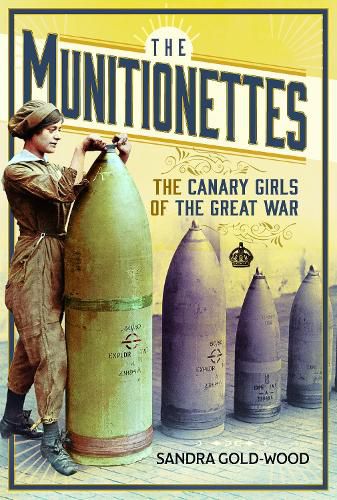Readings Newsletter
Become a Readings Member to make your shopping experience even easier.
Sign in or sign up for free!
You’re not far away from qualifying for FREE standard shipping within Australia
You’ve qualified for FREE standard shipping within Australia
The cart is loading…






The Munitionettes focuses on the lives of a special group of women and girls in the lead-up to and during the First World War. It is, in part, the social history of the hundreds of thousands of forgotten heroines who also became known as the Canary Girls and endeavours to highlight these women's essential input in support of the armed forces during the First World War, which has largely been overlooked. Here, you will find descriptions of the experiences of young women in the specifically built munition factories in their own words as they speak to us from history. It looks at working practices and the place of women in society, all of which are utterly alien in today's world. The book focuses on the many hardships, sacrifices, injuries and the kind of working conditions these women endured against a background of prejudice and suspicion in this truly male-dominated world. It illustrates that even without encouragement and very little support from society in general, the women gave of themselves for their country. The book also shows how women workers gained respect for themselves for a brief period after the First World War; however short-lived this period was, it was the beginning of change for all women. AUTHOR: Sandra Gold-Wood studied psychology, sociology and group dynamics during the late 1980s. In the 1990s, she was instrumental in setting up a women's crisis line. Part of this work involved working with the police to change attitudes toward women reporting serious assault. Working in youth and community services, she was involved in policy writing for women in the service in Hertfordshire. A charity events organiser and a trained counsellor, she also worked for a number of years as a journalist, writing a popular reportage column in a local paper and feature articles in a variety of magazines. At present, she is leading a campaign to create a national memorial for the munitions workers in the National Memorial Arboretum. 20 b/w illustrations
$9.00 standard shipping within Australia
FREE standard shipping within Australia for orders over $100.00
Express & International shipping calculated at checkout
The Munitionettes focuses on the lives of a special group of women and girls in the lead-up to and during the First World War. It is, in part, the social history of the hundreds of thousands of forgotten heroines who also became known as the Canary Girls and endeavours to highlight these women's essential input in support of the armed forces during the First World War, which has largely been overlooked. Here, you will find descriptions of the experiences of young women in the specifically built munition factories in their own words as they speak to us from history. It looks at working practices and the place of women in society, all of which are utterly alien in today's world. The book focuses on the many hardships, sacrifices, injuries and the kind of working conditions these women endured against a background of prejudice and suspicion in this truly male-dominated world. It illustrates that even without encouragement and very little support from society in general, the women gave of themselves for their country. The book also shows how women workers gained respect for themselves for a brief period after the First World War; however short-lived this period was, it was the beginning of change for all women. AUTHOR: Sandra Gold-Wood studied psychology, sociology and group dynamics during the late 1980s. In the 1990s, she was instrumental in setting up a women's crisis line. Part of this work involved working with the police to change attitudes toward women reporting serious assault. Working in youth and community services, she was involved in policy writing for women in the service in Hertfordshire. A charity events organiser and a trained counsellor, she also worked for a number of years as a journalist, writing a popular reportage column in a local paper and feature articles in a variety of magazines. At present, she is leading a campaign to create a national memorial for the munitions workers in the National Memorial Arboretum. 20 b/w illustrations